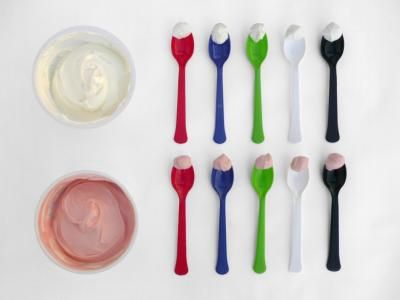
To make food healthier, don't just cut the salt. Instead, try serving it with a knife as well.
The cutlery a person uses can alter the tastes they experience when eating, possibly making blander (and healthier) foods taste like the saltier (less healthy) variety, new research suggests.
For instance, cheese tastes saltier when eaten with a knife, and yogurt tastes denser and more expensive when eaten with a plastic spoon, according to a new study published today (June 25) in the journal Flavour.
"This thing that we've ignored for so long, the cutlery, in fact does have an impact on the food we eat," said study co-author Charles Spence, a psychologist at the University of Oxford in the United Kingdom.
The findings could one day help scientists tweak utensils to help people eat healthier, for example, by giving eaters the same salty sensation they get from processed foods, but with reduced salt. [9 Snack Foods: Healthy or Not?]
"The idea would be to use these cues to reduce the actual content of the unhealthy ingredients in a food by giving the psychological impression of saltiness or sweetness without the negative consequences," Spence told LiveScience.
A growing body of research suggests that people's enjoyment of food is related to many factors beyond a meal's actual taste.
Sign up for the Live Science daily newsletter now
Get the world’s most fascinating discoveries delivered straight to your inbox.
A 2011 study found that white plates make food seem tastier, while another study found that hot chocolate tastes better in orange cups. And other research has shown that everything from the price on a bottle of wine to the size of a bowl can affect people's experience of foods.
To see how cutlery affected taste, Spence and his colleague Vanessa Harrar conducted three experiments. In the first, the researchers asked 35 participants to rate the expensiveness, sweetness and density of yogurt eaten with several plastic spoons, some of which were lighter weight than others.
The yogurt eaters rated food eaten from a lighter spoon as denser, more expensive and more enjoyable than yogurt eaten from heavy spoons.
In a second experiment, 30 participants rated yogurt eaten from different-colored spoons. Blue spoons seemed to make the pink yogurt taste saltier, whereas other colors didn't show a significant effect.
In the third experiment, 30 participants rated the saltiness of cheddar cheese eaten using a fork, a spoon, a toothpick or a knife. The cheese tasted saltiest when served on a knife.
It's not clear exactly why these trends occur.
But the findings could have implications for chefs, food scientists and cutlery makers hoping to subtly enhance the eating experience.
Several of the researchers' previous findings on cutlery and plates are being tested in cooking schools and restaurants, to see if they hold true outside the laboratory setting, Spence said.
Follow Tia Ghose on Twitterand Google+. Follow LiveScience @livescience, Facebook & Google+. Original article on LiveScience.com.

Tia is the managing editor and was previously a senior writer for Live Science. Her work has appeared in Scientific American, Wired.com and other outlets. She holds a master's degree in bioengineering from the University of Washington, a graduate certificate in science writing from UC Santa Cruz and a bachelor's degree in mechanical engineering from the University of Texas at Austin. Tia was part of a team at the Milwaukee Journal Sentinel that published the Empty Cradles series on preterm births, which won multiple awards, including the 2012 Casey Medal for Meritorious Journalism.











